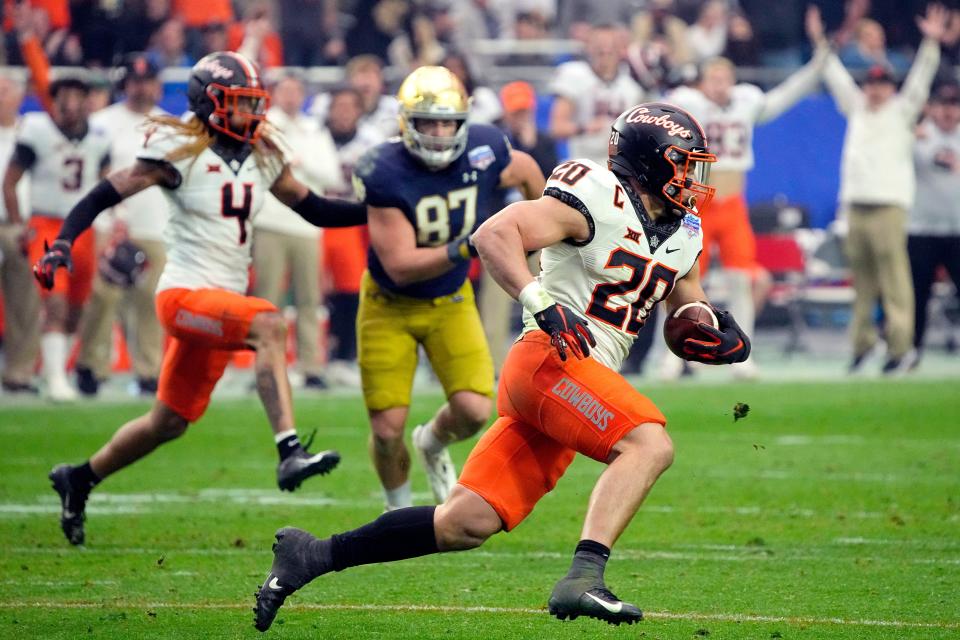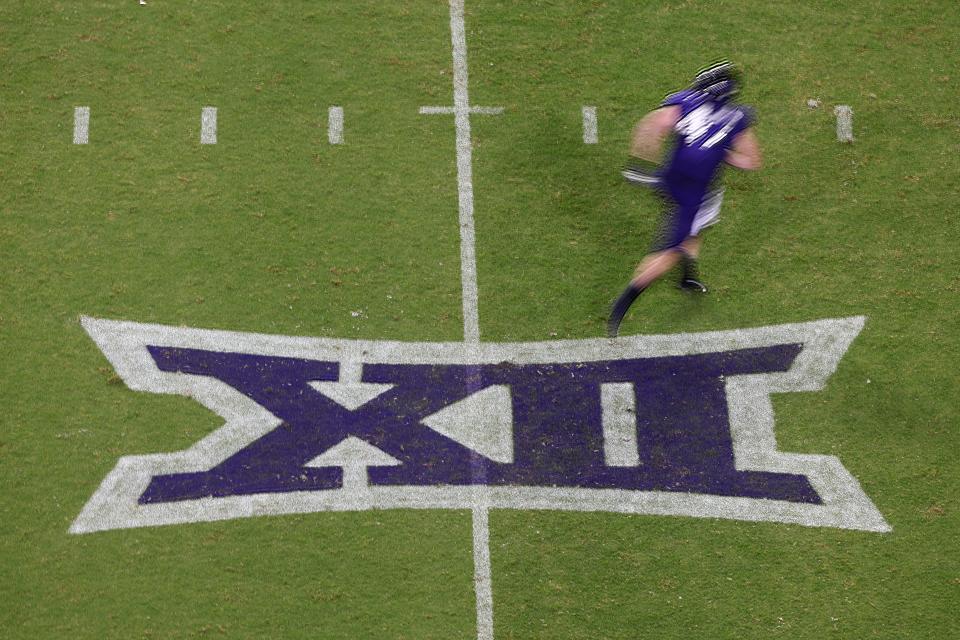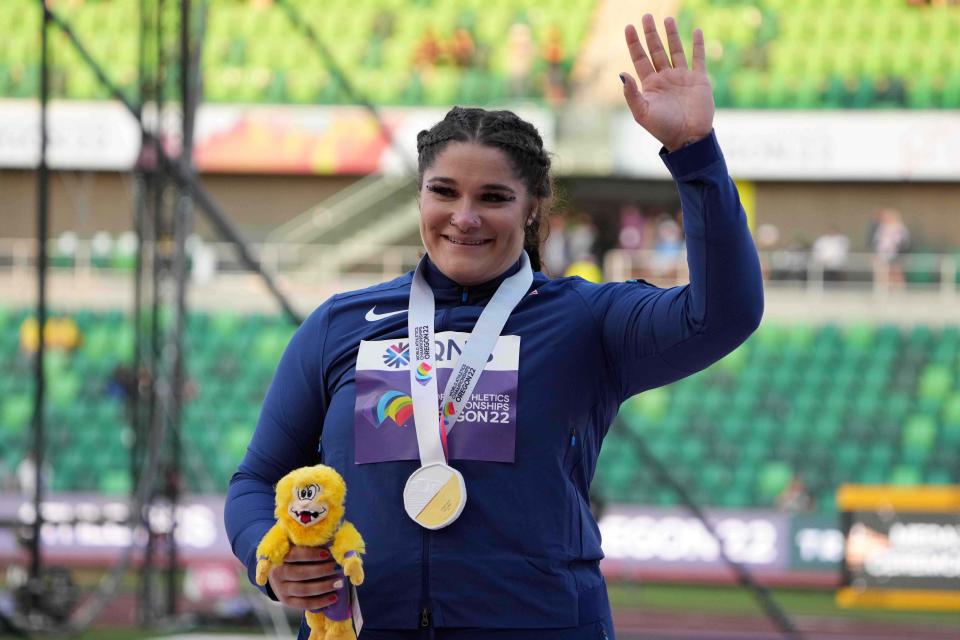Tramel's ScissorTales: How a Big 12/NBC college football TV deal could work
CBS Sports reported Monday that the Big 12 could become a sidekick for Notre Dame football telecasts on NBC.
The thesis: Notre Dame would like $75 million a year for its television rights, which is a lot of money for six or seven games.
That kind of TV revenue would keep the Fighting Irish within spitting distance of the Big Ten, which is expected to soon garner a new television contract worth about $90 million a year for each of its 16 schools, once Southern Cal and UCLA join in 2024.
The Southeastern Conference, which is adding OU and Texas, likely in 2025, is expected to reap more than $100 million annually per school with its new ESPN contract.
But for NBC to meet those $75 million Notre Dame expectations, a deeper commitment to college football might be required. NBC would need to become a weekly destination for college football fans.
More:Why Oklahoma State football players call Rob Glass the 'most important guy' in the program

The NBC/Notre Dame relationship goes back 30 years and has been fruitful for both. But since NBC’s college football telecasts are limited to only Notre Dame’s designated home games, the supply is sparse.
ESPN, Fox and their auxiliary cable channels go wall-to-wall college football most autumn Saturdays. And while CBS’ longstanding (but soon ending) contract with the SEC is typically only one game a week, it is every week.
NBC’s first choice reportedly is part of the Big Ten package, which is expected to go heavily to Fox.
A 16-team Big Ten has enough inventory to produce several quality games a week, so it comes down to how much is left on the table after Fox’s selections. Additionally, the Big Ten might choose to squeeze out NBC in hopes of enticing Notre Dame to join the conference.
Enter the Big 12, which finishes up its ESPN and Fox contracts after the 2024 season.
The Big 12 was expected to take a major haircut in TV revenue with the departure of OU and Texas, and no matter what happens, the Big 12 will lag behind the likes of the SEC and Big Ten.
But the Big 12 could face a better financial future than the original fears. The depleted Pac-12, without USC and UCLA, lifts the Big 12 in the marketplace food chain.
The SEC and the Atlantic Coast Conference are contracted out for more than a decade. The Pac-12 is diminished.
That means after the Big Ten and Notre Dame, the Big 12 becomes the best content available, on a medium desperately seeking live sports, the last bastion of network television.
Tramel's ScissorTales: Why Oklahoma State is no Big Ten candidate, but it's good that people think so

And if the Big 12 can fortify itself even more by poaching schools from the Pac-12, the Big 12 would be in reasonable negotiating position. Conveniently, Notre Dame’s current NBC contract ends when the Big 12’s current television contracts expire.
The Big 12’s holy grail would be adding Oregon, Washington, Utah and dealer’s choice (Arizona State, Colorado or Arizona) from the Pac-12. That would create a 16-school Big 12 that while not approaching the OU-Texas salad days in TV prowess, would clearly place the Big 12 No. 3 among the Power Five conferences.
If Oregon and Washington are a no-go, a lesser 16-team Big 12 still would have some cachet and much more stability than before.
But a Big 12/NBC contract could work this way. On Saturdays of Notre Dame home games, the Irish could be part of a doubleheader with the Big 12. On Saturdays without Notre Dame home games, NBC could produce a Big 12 doubleheader.
NBC could have the pick of the Big 12 slate. OSU-Baylor. Brigham Young-Utah. Cincinnati-Kansas State. If the blessings fall, Oregon-TCU and Washington-Iowa State.
It’s not Michigan-Penn State or OU-Georgia, but the Big Ten and SEC don’t always produce two games a week like Michigan-Penn State and OU-Georgia.
The Big 12 would need a secondary, cable contract, and that could be fruitful, too, especially in the late night window. NBC has scrapped its NBC Sports Network, so that’s not an option.
Tramel: Why a merger between Big 12, Pac-12 conferences was never in the cards
ESPN and Fox could remain in the hunt for the Big 12’s cable rights. ESPN, in particular, will have holes to fill, since it routinely shows multiple games on four cable networks – ESPN, ESPN2, ESPNU and SEC Network.
Fox generally has only FoxSports1, so ESPN might be the more likely play.
But Turner Sports – TNT, TBS – is seeking more and more content. It already has a huge presence with Major League Baseball and the NBA. Some say Turner wants back into college football – TBS broadcast a bunch of college football from 1982-91, then had another run in the early 2000s, including with the Big 12.
The current Pac-12 schools offer college football its only big-time, late-night games. If Turner were to grab the Big 12 cable rights, it could produce a Saturday night doubleheader each week. A game from the Central or Eastern time zones, then a game from the Mountain or Pacific time zones.
A West Virginia-Houston game at 6 p.m. wouldn’t draw huge numbers but could be a lead-in for a 9:30 p.m. Texas Tech-Arizona State game. College football fans aren’t picky after 10 p.m. They know the Alabama game is over.
All of this is why the Big 12 hired Brett Yormark as commissioner. He knows the inner workings of these kinds of deals.
The Big 12 is not in great shape financially. But it could be in solid position to negotiate a television package far better, in both cash and marketing, than we thought possible a year ago.
More:A look at The Oklahoman's 2023 Super 30 high school football recruiting series
Cowgirl alum Ealey is shot put queen
OSU alum Chase Ealey is a world champion. Ealey won the women’s shot put Saturday in track and field’s World Championships in Eugene, Oregon.
Not bad for a sprinter.
That’s right. Ealey originally was a sprinter (and a softball player) back in Los Alamos, New Mexico. She won two state championships in shot put but was a four-time 100-meter gold medalist in New Mexico’s Class 4A state championships.
Ealey, who turns 28 Wednesday, credits OSU coach Dave Smith with making her a full-time shot putter.
“It was the direction everyone was pushing me, but it was something I really fell in love with eventually,” Ealey told the Albuquerque Journal. “It was what all the colleges were recruiting me for.”
But while Smith recruited Ealey a decade ago, he told her, “I think you could make the team this year and you can really go far with throwing,” Ealey related. “After that, I started to love it more, but it really didn’t start building until I got to college.”
Ealey never won an NCAA or Big 12 title, but she was a runnerup in both and she set OSU’s indoor and outdoor shot put records.
And Ealey’s career took off in recent years. She switched from glide throwing to the more traditional rotational release
Ealey won the 2019 U.S. indoor and outdoor titles. In May, she won the U.S. championship again, with a throw of 64 feet, 2¼ inches, then in June she won the U.S. Trials with a throw of 67-2¼.
Finally came Eugene, where her first throw went 67-2½. Ealey was a world champion. The first American woman ever to win the shot put world championship.
2022 MLB Draft tracker: Where players with Oklahoma connections are headed

Talking baseball at Castle Falls
If you like baseball, and you like Oklahoma City history, and you can sort of stand being around me, you might want to join us next week, on Thursday, at Castle Falls in west OKC.
Sisters Amy Rollins and Robin Jones host the Historically Local Speaker Series at Rollins’ Castle Falls Venue, and I’ll be there at 7:30 p.m. July 28 to speak about the history of Oklahoma City baseball.
Castle Falls is a fabulous, upscale restaurant situated in a castle-home at 820 N MacArthur. Adjacent is an events center, where we’ll meet. I would suggest dinner before the baseball talk.
The series is in conjunction with the WesTen District, a group seeking to build up west Oklahoma City. The speaker series focuses on west OKC history. Depending on the boundaries you draw, Oklahoma City baseball has a decent history in the west part of town.
I’ve been to a WesTen event, and it’s a great community of people doing good work.
I’m no expert on much of anything, but I do like baseball history and Oklahoma history, so we’ll have a lot to talk about.
The presentation will be interactive and informal and a lot of fun.
There is no charge for the event, but registration is encouraged. You can register here.
Tramel's ScissorTales: Jazz, Spurs mimic Sam Presti's tanking plan for the Thunder
The List: Next Russell Westbrook team odds
Russell Westbrook apparently wants out of Los Angeles, after the Lakers’ experiment of teaming Westbrook with LeBron James and Anthony Davis turned into a disaster last season.
Westbrook split with his 14-year agent, Thad Foucher, this off-season, and Foucher took the extraordinary step of explaining why, saying he believes Westbrook should work to stay with the Lakers and restore his value, after three trades (Thunder to Rockets, Rockets to Wizards, Wizards to Lakers) that chipped away at Westbrook’s reputation as not just an NBA star, but a viable pro basketball player.
Bookies.com has set the odds for Westbrook’s 2022-23 team:
1. Lakers 3/2: The Lakers are the clear favorite, for the simplest of reasons. Does any team really want Westbrook? No.
2. Hornets 11/2: Charlotte makes the most sense in a trade, for three reasons. 1) Westbrook and Hornets owner Michael Jordan have an apparent solid relationship; 2) Charlotte star Miles Bridges is facing domestic-violence charges in Los Angeles, so the Hornets’ plans and prospects are in chaos, and chaos leads to curious decisions; 3) Westbrook would help sell tickets, which is a factor in Charlotte.
2. Pacers 11/2: I don’t see it. Indiana has forged ahead with a rebuild around young guards Tyrese Haliburton and Bennedict Mathurin. The Pacers know what they’re doing. They wouldn’t want Westbrook to spoil the soup.
4. Netropolitans 6/1: You never know with Brooklyn, but it sure wouldn’t make sense to trade Westbrook for any kind of Kyrie Irving deal. The Lakers have nothing to offer to entice Brooklyn. Westbrook no longer is an enticement.
4. Spurs 6/1: San Antonio makes some sense. The Spurs aren’t trying to win and conceivably could take on Westbrook’s $47 million salary. But would the Lakers offer the draft picks required to make it worth San Antonio’s trouble?
6. Thunder 8/1: No. Been there, done that. The Thunder loves Westbrook, appreciates his legacy in OKC, but nothing he brings now helps the Thunder. Turmoil is not needed in the 405.
More:Kenrich Williams signs four-year extension with OKC Thunder
Mailbag: Pac-12 expansion
The Pac-12's fate remains unknown in the wake of the USC-UCLA exodus to the Big Ten. Will the Pac-12 fracture? Will it expand? Will it forge ahead with the remaining 10 schools?
Readers want to know.
Michael: “Geez, your thought of Pac-12 adding San Diego State and Boise State makes no sense. Why would Pac-12 devalue themselves by adding two minor schools? They aren't AAU schools or in a huge media market to bolster current ranks. That is the dilemma facing current Pac-12 without LA schools. There isn't an ideal solution.”
Tramel: Michael is right. There is no ideal solution. But if the remaining 10 members of the Pac-12 stick together, their best plan forward is to mimic the Big 12, which was in a similar situation a year ago, seemingly on the verge of extinction, yet found some footing and now at least has a future.
The Big 12 added Cincinnati, BYU, Central Florida and Houston. San Diego State and Boise State are not in that class of mid-major attractiveness (though I would put Boise State ahead of Houston), but they are the best available.
And I think Boise State (and to a lesser extent San Diego State) would lift the overall value of the Pac-12. Not a ton, but some. Heck, I would take Boise State over Colorado for the Big 12. Wouldn’t hesitate.
Here’s an explanation for Pac-12 expansion. Let’s say some television network was planning to pay $100 million a year for Pac-12 football. That’s just a round money to make the math easy and not meant to be some kind of guess. Ten teams, $100 million, that’s $10 million a year.
If you add a school, would that school bring more than $10 million in value, raising the overall average payout? I would say yes on Boise State.
The Broncos have a decent reach. I would say Boise State would bring more TV dollars than Oregon State or Cal-Berkeley, for example. Maybe even Arizona. Nobody stops the TV dial to watch Arizona, but some do stop the dial to watch Boise State.
Berry Tramel: Berry can be reached at 405-760-8080 or at btramel@oklahoman.com. He can be heard Monday through Friday from 4:40-5:20 p.m. on The Sports Animal radio network, including FM-98.1. Support his work and that of other Oklahoman journalists by purchasing a digital subscription today.
This article originally appeared on Oklahoman: Big 12 football would be good TV sidekick with Notre Dame on NBC

